The restaurant industry is highly competitive, so being able to understand the strengths and weaknesses of your business is paramount.
You can use that information as a starting point in order to improve your services.
And what better source of that information than your own customers?
Gathering feedback from your customers is crucial, as their opinion ultimately determines your success.
Therefore, you should always strive to discover what your guests want and how you can meet their needs and expectations.
As there are many ways to collect feedback, our goal in this article is to highlight six of the most effective techniques you can use, starting with the in-person method.
Ask For Feedback in Person
The simplest way to collect feedback is to go up to your customers directly and have a conversation about their experience at your restaurant. In addition to giving you valuable insights, this approach also shows your guests that you care about them.
Naturally, your servers play a crucial role in this process.
A waiter’s job is not only to serve your guests attentively but also to act as a representative of your restaurant, and that includes inquiring after the guests’ dining experience.
Without being too intrusive, waiters can ask some questions like:
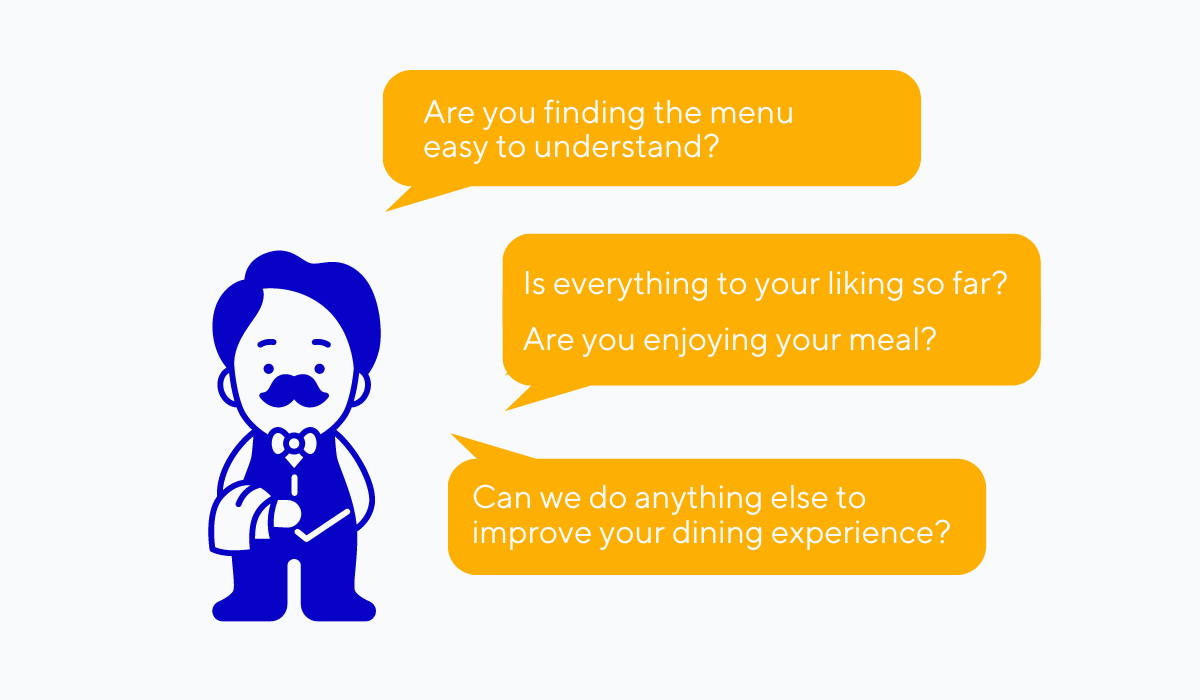
Source: Tablein
By asking these questions, servers can get immediate feedback from guests, which can help them identify any issues or concerns in real time.
For example, say a guest orders a meal that isn’t sufficiently cooked.
Without someone there to do the check-back, some guests will simply eat their meal as is and leave dissatisfied—which may reflect in their online reviews after.
However, if a waiter asks whether they are enjoying their meal at the right moment, this issue can be remedied immediately, and the waiter can have their food remade to their preference.
In addition to timely check-backs, it’s important to solicit feedback about the quality of the food after the guests are done eating.
While the dining experience is still fresh in their minds, you as the owner, or their waiter, can politely approach the guests and ask them what they thought of their food, to get valuable insights and indicate that you care about their happiness.
And if you’re not sure how to approach them, a good idea is to act as written in Toast’s 2020 Guide to the Restaurant Guest:
Ask what they look for in food quality and ingredients and what they do or don’t like to see on their plates.
In short, checking in with the guests regarding their impressions of their meal and your service in person is a powerful way to build relationships with them and quickly address any issues they may have.
Keep in mind, however, that some guests may feel uncomfortable being put on the spot like that, and made to voice their grievances face-to-face.
That’s why, in the following sections, we also discuss other methods of collecting feedback.
Distribute Feedback Forms
If customers aren’t too keen on giving you their feedback in person, you can always give them a physical feedback form they can fill out whenever they want—on their terms and at their own pace.
A commonly used feedback form is the comment card, which servers can give to customers along with their bill, to complete before they depart.
Although you can’t use these cards to solve problems immediately as with the previous method we mentioned, this is still an easy solution for getting feedback that you can use to improve your services and meet your customers’ needs for their future visits.
Take a look at a simple comment card design that you can use:
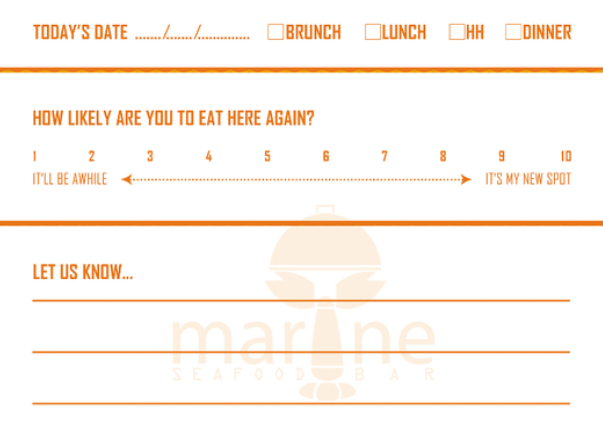
Source: Template
These cards typically include a few multiple-choice questions related to your guest’s dining experience that help you get to the specific answers that interest you, and one or more open-ended questions where customers can describe their experience or leave additional comments and suggestions.
While it can be tempting to include many questions on a comment card to get the most detailed feedback, it's important to keep it simple and easy to fill out.
Try to ask just the most important questions about your guests’ expectations and whether you fulfilled them, adding questions to the form such as:
- Did we exceed your expectations? Yes/No
- Why?
- Can we follow up with you? Yes/No
- What is the best way to get in touch with you?
With a mix of a few closed and open-ended questions in your comment cards, you will have a simple but effective way of collecting valuable feedback from customers without engaging with them directly.
Request Feedback Through Email
Another great way to collect feedback without being intrusive is by taking advantage of emails.
Plus, this method allows you to connect and engage with your guests after they’ve left your restaurant.
Sending out emails is an effective way to collect feedback as it allows you to reach many customers quickly and easily, and it has a similar benefit to feedback forms because guests can write their feedback at their convenience.
If you have any concerns about the effectiveness of this method, you can rest assured knowing that customers are open to receiving emails from restaurants in general.
Data confirms this:
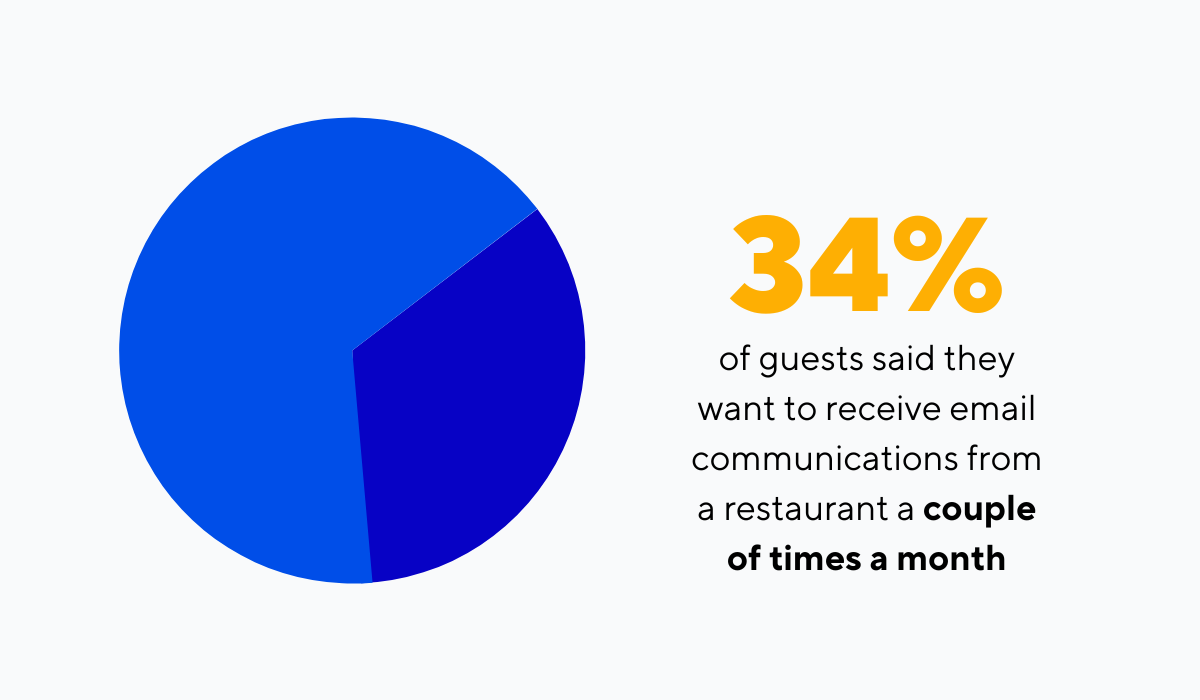
Illustration: Tablein / Data: Toast
Just make sure you don’t overdo it. So for instance, if you have repeat customers, limiting your feedback request emails to just a few a month is a good idea.
Although you could collect email addresses and prepare mailing lists to send emails manually, that would be tedious and time-consuming.
Instead, our table reservation system, Tablein, offers you a great way to automate this process.
Tablein provides a streamlined solution for reservation management, helping your guests book a table at your establishment online, while also offering many additional features to help you efficiently manage your restaurant operations.
As mentioned, this includes automating the feedback request process through email.
Take a look at this screenshot:
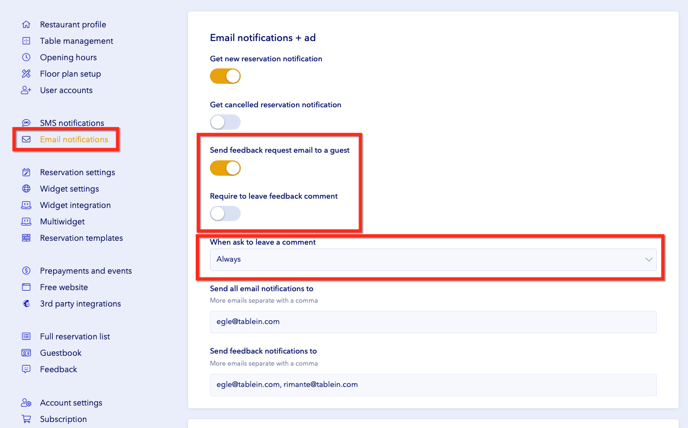
Source: Tablein
As you can see, Tablein offers the option to automatically send feedback request emails to your guests as a part of their email notification feature.
This feature has several great customizable options, such as the ability to change when the request emails are sent.
For example, your goal may be to get guest feedback just to identify your flaws and address them—in that case, you can set the Tablein system to only send feedback requests when guests leave a rating below five stars.
Or, you can choose to always send out these emails to get the most data you can and evaluate both your strengths and weaknesses.
Either way, a simple email sent to your guests can go a long way when it comes to collecting their opinions—and a tool such as Tablein can streamline this process even further.
Create an Online Survey
Although they aren’t as personalized as emails, online surveys are a simple and cost-effective way to gather a large amount of feedback from your customers quickly.
Surveys are versatile tools that help gather a wide range of customer feedback, from the overall experience with your establishment to specific aspects, like the quality of the food or the friendliness of the staff.
Restaurant surveys typically cover five types of questions:
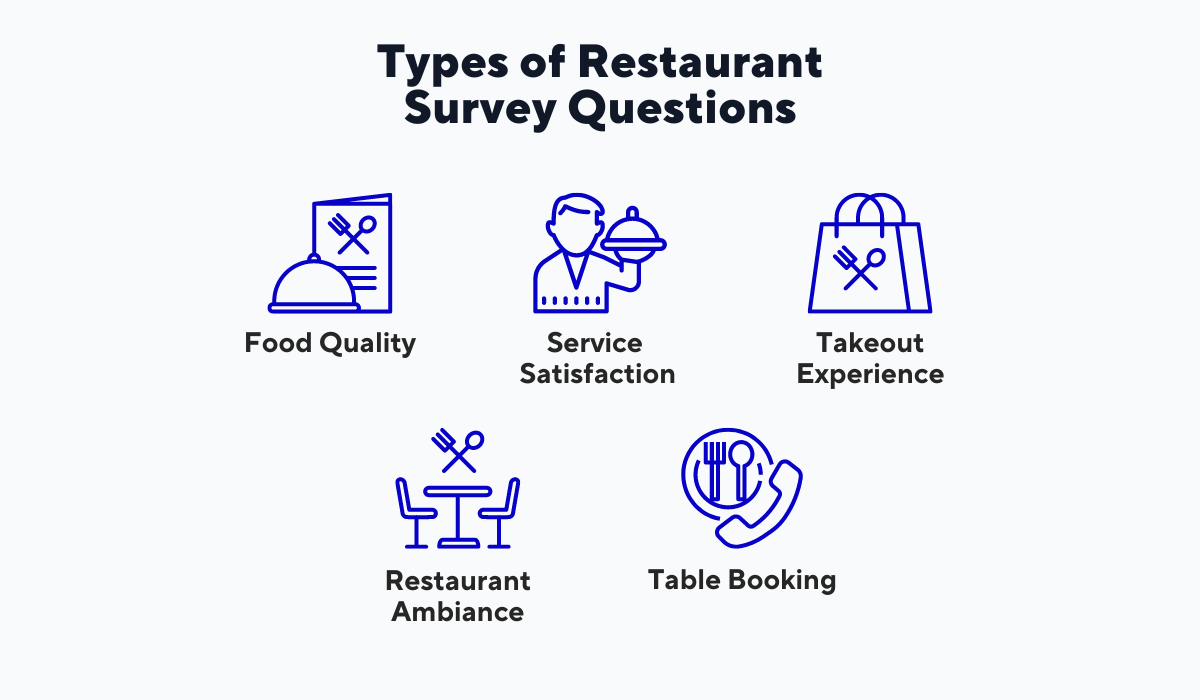
Illustration: Tablein / Data: SevenRooms
These questions can be tailored to the specific needs of your restaurant, allowing you to gather the data that is most important to you and, in contrast to printed feedback forms, online surveys allow for many more questions to be added.
Even so, keep in mind that most people don’t like filling out excessively long surveys regardless of the format, so be sure to only ask the questions that interest you the most.
For instance, the McDonald’s customer satisfaction survey you can see in the following screenshot is a classic example of an online survey:
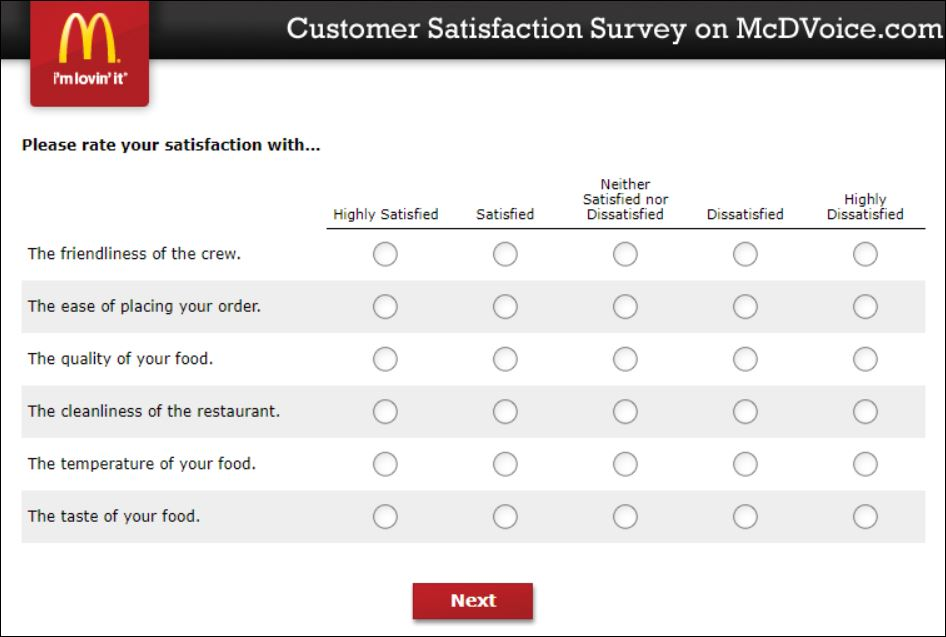
Illustration: Tablein / Data: Official Survey
As you can see, this survey focuses on the guests’ impressions of the food and their satisfaction with the service and restaurant ambiance, using a five-point scale to get quantitative data.
McDonald's has a great way of incentivizing guests to fill out their survey as well.
After a meal, guests will receive a unique survey code on their receipt that they can enter on the McDVoice website, and after filling out the online survey successfully, they get a special prize—a buy-one-get-one-free coupon code that they can claim at their next order.
Consider giving your guests a similar incentive, as it can increase the number of survey responses you get and give your guests a reason to take the time to provide feedback, knowing their opinion is appreciated and rewarded.
Gather Feedback on Social Media
Your social media channels are a great way to promote your restaurant, but have you considered that they are also a powerful tool for gathering feedback from your guests and engaging with them in real time?
Customers like to share their thoughts, even when not asked for feedback directly, and online forums, review sites and social media platforms are where they tend to voice their opinions the most.
In fact, according to a Restaurant Dive survey, 74% of consumers spontaneously express their satisfaction or dissatisfaction with businesses online.
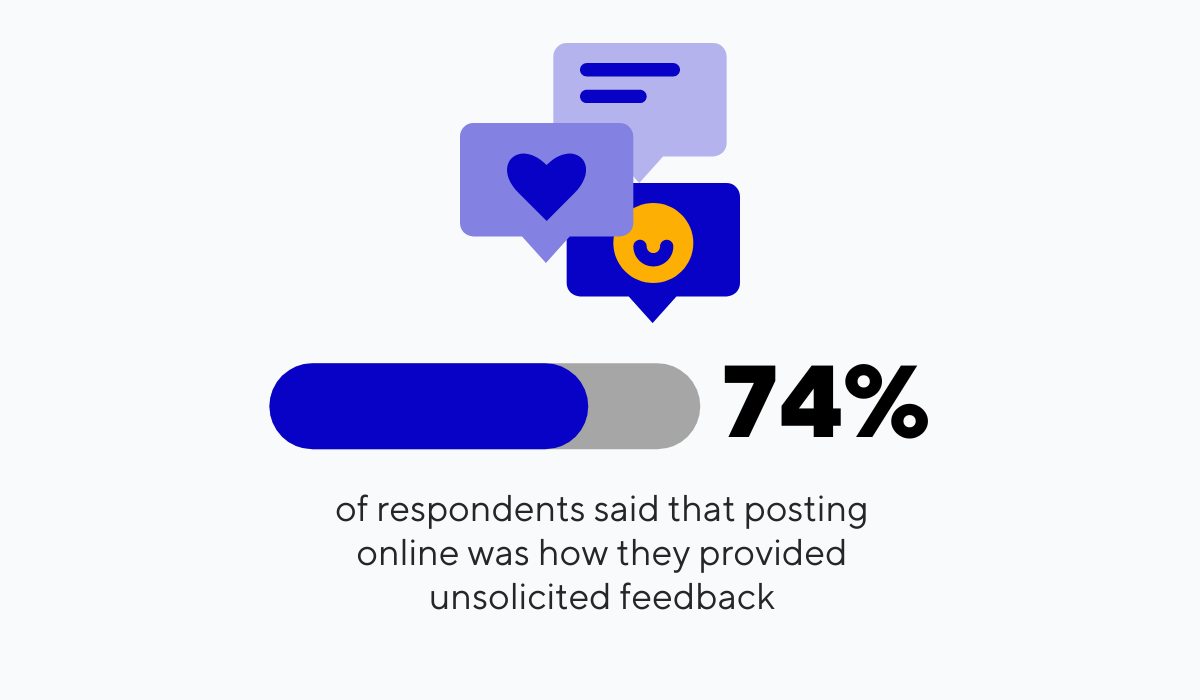
Illustration: Tablein / Data: RestaurantDive
Use this data to your advantage and occasionally go through your existing social media posts and read any newly posted comments.
This is a great practice that can get you valuable feedback with minimal effort.
You can also use social media to solicit feedback actively, by creating dedicated posts on various platforms such as Facebook, Instagram, YouTube, or Twitter.
There, you can engage your followers and ask them to answer questions, give ratings, or comment on your offerings.
For example, if your restaurant is active on Instagram, there are many ways to collect feedback on this platform by posting stories with:
- Polls
- Emoji sliders
- Question stickers
- Quiz stickers
- Clickable links to a survey
Take a look at one such example, where Starbucks used a question sticker to gather feedback through their Instagram profile.
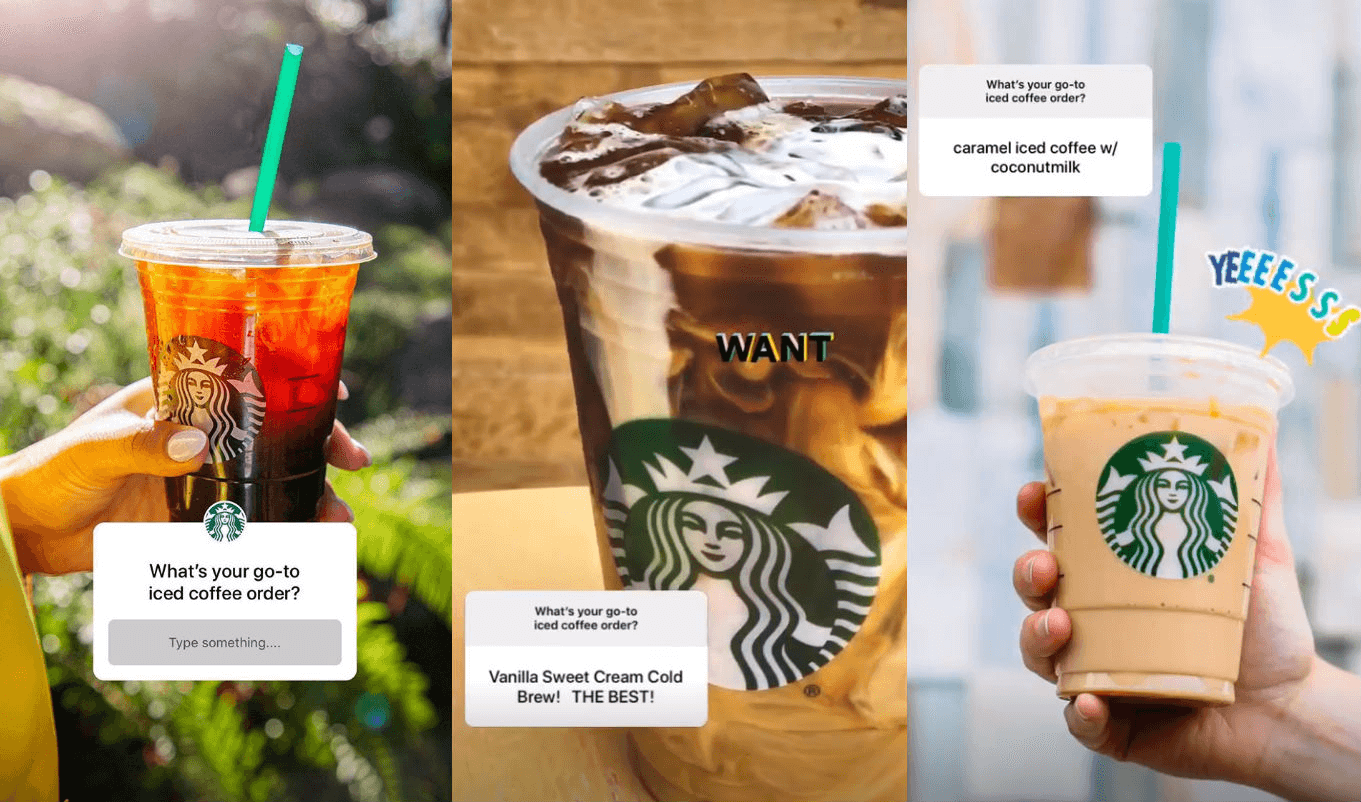
Source: Quintly
As you can see, Starbucks used this option to get a sense of which of their products are most popular among customers.
It’s likely that they then used that information to create special promotions around those products.
As you probably already invest large amounts of time growing your social media presence, using these platforms to collect feedback and communicate with customers is a great way to use them to their fullest potential.
Create an Account on Review Sites
Online review services like Yelp and Google My Business have become an essential part of doing business in the restaurant industry, and creating a profile on these platforms can not only showcase your restaurant but also help you gather valuable feedback.
This is common practice for any restaurant, as you’ll want to use it for both effective reputation management and to promote your business—considering the fact that 35% of guests discover new restaurants through online reviews.
Although using review sites can be viewed as a necessity, you need to remember that they have advantages and disadvantages.
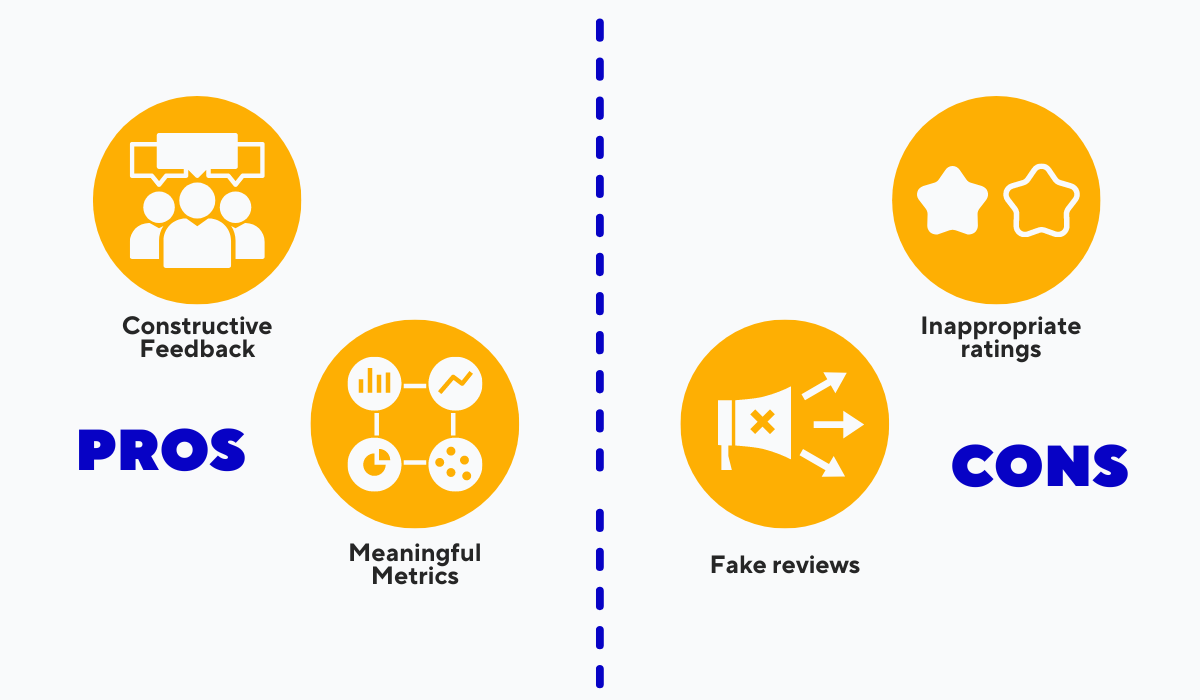
Illustration: Tablein / Data: Carbonara
One of the most significant benefits of review sites is the access to valuable feedback they give you.
Not only can you read constructive feedback from customers, but you can also access meaningful metrics to analyze, such as the number of visitors to your restaurant's page, the ratings of individual dishes or aspects of your service, and the frequency of specific complaints or compliments.
However, a major disadvantage is that you can also get unfavorable or even inaccurate ratings.
For instance, one-star ratings that may not be deserved can still negatively impact your reputation.
Additionally, anyone nowadays can leave fake reviews, whether it's competitors trying to sabotage your business or people who have never even visited your establishment.
These are not unusual things to happen.
Restaurateur and author of 101 Restaurant Secrets, Ross Boardman, is aware of these drawbacks and urges restaurants to partner with sites that are more reputable and trustworthy, or have stricter editorial policies.

Source: Quora
To sum up, review sites let you use their large customer base to your advantage, as you can use the ratings and comments to gauge what people think of your restaurant.
Which review platform you opt for is up to you. Just make sure to take everything with a grain of salt.
Conclusion
Gathering customer feedback is a crucial part of running a successful business, not only for improving the quality of your restaurant's services but also for building a loyal customer base.
By using some of the feedback collection techniques we’ve covered in this article, you can start getting valuable information that will help you find out whether your guests are satisfied with your restaurant and what areas you need to improve on.
So, take any chance to get valuable insights into your customers’ experiences and preferences.
We encourage you to explore the many different feedback channels available to you and start collecting feedback today.
Get a 30-day Exclusive Trial
As a Tablein blog reader, you’re eligible for an exclusive 30-day free trial to experience our simple reservation solution for your restaurant.
Enter your business email, and we’ll send you all the steps needed to create your account.
Share this
You may also like

The Full Guide to Restaurant Reservation Confirmation Emails

The Ultimate Guide to Restaurant Cancellation Fees
